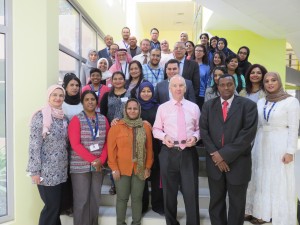It is five years since the contract with the University of Bahrain came to an end. PCAP programmes (which included HEA Fellowship recognition) had been successfully led by York St John University staff for about six years. The question is, did it make a difference?
I had the good fortune to be invited back after a long absence to teach on the staff development programme run by Dr Sana Al-Mansoori, an outstanding member of the first cohort of PCAP participants. I led three workshops on consecutive days which far exceeded expectations. The enthusiasm of the academic staff was both impressive and, at times, bordering on the comedic. The limit of 25 resulted in 40 registering online and many being disappointed and put on a waiting list. Undeterred, some turned up on the day and, when Sana was not guarding the door, sneaked in. The result was that we had 39 on Day 1. Day 2 followed a similar pattern with some of those who had not enrolled on the second day’s workshop deciding to come after the success of the first day and we had 36. The third day saw a clash with another workshop but we still managed 26.
Enthusiasm is one thing but what struck me most was the level of understanding and the evidence of strong values which underpin the UKPSF (Professional Standards Framework). The University of Bahrain has institutional recognition from the HEA now and Sana is a regular visitor to York for the annual training. The staff who attended the workshop, a mixture of ex-PCAP members, staff following the institutional PCAP and other CPD programmes and other staff were exemplary in their engagement with the ideas and activities. To see the staff passionately engaging in a pyramid discussion with groups of over 15 academics behaving like traders on a stock exchange floor trying to make their point was a sight to behold.
At a time when sadly we are sometimes only as good as our next game, I found it helpful to step back and reflect on PCAP’s success in this Gulf state. York St John has been successful also in Africa, most notably in Kenya, but the results of the University of Bahrain campaign are impressive. But such successes do not just happen. The mixture of strong political will, foresighted leadership, a determined and highly competent programme director, a good PCAP model with strong mentoring and peer observation of teaching and learning and a dedicated workforce all need to come together. The Staff Development Unit is not without its challenges. Sana is also Head of the Engineering Department and has to make the unit self-funding within two years but the direction of travel is clear.
Without a strong PCAP base, it is unlikely that the University would be in such a strong position re staff development. I look forward to returning next year and just hope my next game is good enough.
Dr Mike Calvert
